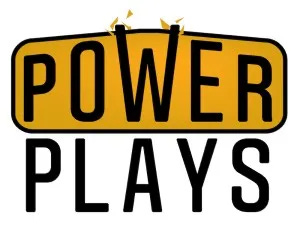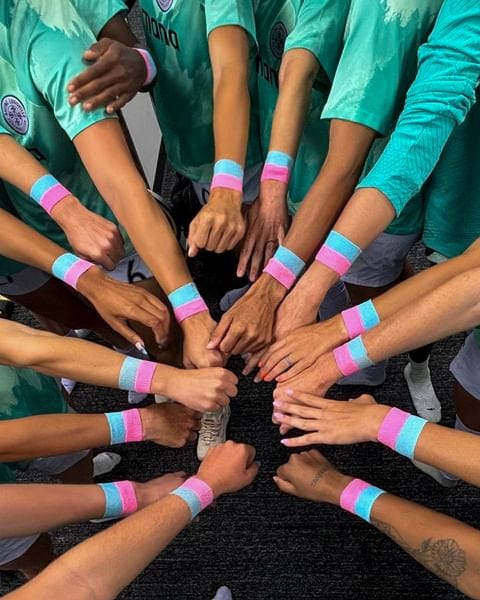Thank you, Bev Yanez
Women's sport is helping remove the shame and stigma around reproductive health.
Hi, friends! Before we get to today’s newsletter, I want to say that there is a trigger warning for pregnancy loss, so take care of yourselves.
I also wanted to let you all know that there won’t be a paid subscriber’s-only newsletter in your inbox this Friday; I’m getting a few big things ready for the Olympics and promise it will be made up to you then! Thanks so much for your support, as always; it’s about to be a big few months at Power Plays and I can’t wait to share it with all of you.
**Remember, paid subscriptions make this work possible, so consider becoming a paid subscriber today!**
This edition of Power Plays is sponsored by the Working Family Party’s “Basketball House,” which throws events that seek to build political power for the multiracial working class by creating community in our fandoms and making collective civic engagement convenient, accessible, and fun.
This Friday, July 12, at 4:30pm MT in Phoenix, Arizona, Basketball House is hosting a watch party for the game between the Phoenix Mercury and Indiana Fever. RSVP here.
Ending the silence
It was, once again, a big weekend for women’s sports. In the NWSL, we had a much-anticipated game between the two undefeated teams in the league, the Kansas City Current and Orlando Pride, who both entered the game 10-5-0. In front of a sold-out stadium at CPKC Stadium, the Pride came away with the 2-1 win behind a goal by Barbra Banda and a penalty kick by Marta, despite playing the entire second half with only 10 players after Carrie Lawrence picked up her second yellow card late in the first. Then, in the WNBA, the already scorching-hot Rookie of the Year race got even hotter, with Angel Reese of the Chicago Sky setting the record for most consecutive double-doubles in WNBA history, and the Indiana Fever’s Caitlin Clark becoming the first rookie in WNBA history to notch a triple double.
But by far the most important thing that happened in women’s sports over the weekend — and perhaps the most important thing that will happen in women’s sports all year — occurred on social media on Sunday afternoon, four and a half hours before the kickoff of the game between the North Carolina Courage and Racing Louisville in Cary, NC, when Racing Louisville’s social media accounts released a statement saying that head coach Bev Yanez was not with the team because she had suffered a miscarriage.
“My family and I are heartbroken with the miscarriage of our baby boy. We are grieving and healing as a family at this time,” Yanez said in the statement. “It is an indescribable hurt that, through sharing my story, I am realizing many have gone through. I’m so grateful for the support around us as we heal our hearts.”
According to the Mayo Clinic, “About 10 percent to 20 percent of known pregnancies end in miscarriage. But the actual number is likely higher.” Unfortunately, there is still so much stigma and shame surrounding miscarriages that most people don’t talk about them even years after they occur, let alone in the immediate aftermath. I haven’t experienced one personally, but know from talks with so many of my loved ones that a miscarriage can be an incredibly lonely and isolating experience, filled with grief and guilt and anger and fear. And because it’s something that people are encouraged to deal with privately, those experiencing the loss are expected to go on with their daily lives as if nothing has happened, to carry on like normal.
That’s why what Yanez did this weekend mattered so much. She had every right to keep her miscarriage private, she did not owe anyone an explanation. But by giving one, she helped others feel seen, and inspired them to share their stories as well.
“Too many women live in silence when this happens,” tweeted Jessica Berman, the commissioner of the NWSL. “It happened to me 3x and it was so lonely. I was scared to tell anyone. @bevyanez - you are not alone.”
“Heartbroken for [Bev Yanez], like [Jessica Berman] said women’s suffer in silence here,” shared Anya Packer, former pro hockey player and wife of PWHL New York player Madison Packer. “During fertility treatments, I had 3 miscarriages as well. I didn’t tell anyone, I pushed through the pain, [Madison Packer] was my rock. We’re never alone, we are strong.”
On the pitch on Sunday, Racing players wore blue and pink wristbands in support of their coach. Yanez’s statement and that symbol of support were shared by multiple official social media accounts with large followings, reaching millions upon millions of eyeballs.
My career is dedicated to covering women’s sports, and on a regular basis I wrestle with why equity in women’s sports matters on an existential level. And, for me, it always comes back to this: Sports give people power and voice and community, and marginalizing women’s sports is a way to deny women access to all of those things. Yanez disclosing her miscarriage, showing others that it is okay to talk about it and to grieve openly and take time off to heal? That’s foundation-shifting in the best way.
I personally cannot remember another person in women’s sports opening up about a miscarriage in this way, though I am sure that some have. But for the past couple of days, I’ve been unable to stop thinking about it, and of the other ways that athletes in women’s sports have used their platforms to end the silence that encompasses reproductive health. I’ve been thinking about Serena Williams opening up about her near-death experience while giving birth to her daughter, Olympia, in 2017 and raising awareness of the devastatingly high Black maternal mortality rate in this country; about Skylar Diggins-Smith talking about her postpartum depression; about three-time Olympic medalist Crissy Perman sharing that she had an abortion; about former No. 1 golfer Lydia Ko talking about how her back pain during her period impacted a round of golf; about current tennis star Danielle Collins citing her ongoing battle with endometriosis as one of her reasons for her upcoming retirement; about Elle Purrier St. Pierre saying that the week of Olympic trials, she got her period back for the first time since giving birth a year ago.
“Honestly, there’s so many things that women have to balance that men don’t,” St. Pierre said. “Women are awesome.”
Reproductive rights in this country are facing a crisis. Just over two years ago, the Supreme Court overturned Roe vs. Wade, ending the constitutional right to an abortion. That has created pure chaos in the world of reproductive health care, from the confusion of state-by-state abortion laws, to challenges to IVF, to limitations on gender-affirming care. Many advocates expect conservative lawmakers to come after birth control next, which is key not only for preventing pregnancy, but also for treating conditions such as endometriosis, menstrual cramps, and anemia.
The stigma around menstruation, pregnancy, miscarriages, abortions, and all issues related to reproductive health care, is one of the biggest tools that men have in the quest to control women’s bodies, and as a result, to exert power over women in general. The stigma encourages silence, and breaking that silence is one of the most effective ways of fighting back.
I’m endlessly grateful to Bev Yanez, and to all those following in her footsteps. Because this is a fight that we must win.






